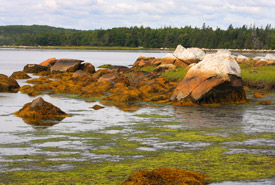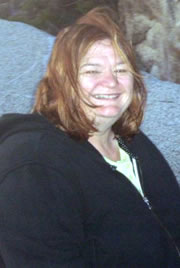There, and back again: Why I left NCC, and then came back

Port Joli, Nova Scotia (Photo by Mike Dembeck)
There is a framed drawing of a turtle that hangs on the wall in my office. Beneath its crusty shell is written:
“Turtles are a symbol of self-nurturance and encouragement. They remind us that despite our busy schedules, we don’t need to panic or do more than we can...slow and steady really does win most races....”
When I thought about writing a blog about why I left the Nature Conservancy of Canada (NCC) and why I came back, I knew right away that the turtle message would be my starting point. Life’s not easy. I wish it was. The heart of the matter for me was that back in 2011 I hadn’t fallen out of love with NCC — quite the opposite. I was still very passionate about NCC and its work but on the personal front, I was fried from over a decade of constant fundraising and I realised I was neglecting other aspects of my life because of work.
I’m a single parent, and my youngest son, who is on the high end of the autism spectrum, was struggling in school and needed more of me at home. My friends and family were worried about me, my heart tank was on empty and I needed to re-fuel. It’s obvious now, but as per the turtle saying...it was pretty obvious I did not practice what I preached.
The move to the Art Gallery of Nova Scotia was a wonderful opportunity for me to do something different for a while. It also gave me more time at home and allowed me to explore a different canvas, so to speak. Plus, for me, communications, marketing and development are all part of the fundraising cycle. We create awareness through communications, generate customers and constituents through marketing and build relationships with those constituents until they start to support you with donations. So a move to AGNS was not leaving fundraising behind, just switching to more of a marketing groove for a while.
During my two-and-a-half years at the Art Gallery of Nova Scotia, I continued to keep in touch with my former NCC colleagues and to have adventures in some of my favourite NCC sites. That included Port Joli, Musquodoboit Harbour, Prospect High Head and my trusty rock at Economy Point.
I realized that I missed the NCC team and my colleagues in “Team Atlantic.” And, after a break from fundraising, I did eventually find myself missing the relationship building that is the foundation of development work.
Time, experience, intuition, imagination, what sifts through us, when, why and how...it all fascinates me. All of what we have lived, observed or imagined ends up sparking and morphing into something larger, so....the choice to come back to NCC was fortuitous, meant to be.
When Linda Stephenson, the regional vice-president for NCC’s Atlantic Region, called and asked me whether I would consider coming back, she didn’t give me very long to make a decision. And so.
Walk. Sit. Listen. Advice from friends.
I said yes, I will come back.
Returning to NCC is one of the best things I’ve done. I’ve come to realise that the record of my time at NCC is tangibly reflected in the landscapes that I have, in my own small way, helped to protect. As someone who grew up in the UK and has seen vast amounts of green space disappear around my home town, it fills my heart with joy to know that I’m contributing to the creation of protected areas in places that are carefully selected to conserve native species and natural ecosystems — not just for myself, but for my children and hopefully any grand-children that might come along.
The legacy factor was an important piece in my decision to return. Also NCC’s properties are so diverse and make for a fabulous teaching and learning resource. As a parent, I love the fact that NCC is working to get children and families out and about, participating in things like the Conservation Volunteers program so that together, we can discover the beauty in our own backyard. Quality family time. Priceless!
However, in returning, I also knew I would have to be careful — because the pressure of an increasingly demanding work culture is a challenge we all face. Lessons to be learned and hopefully not repeated include:
- Take a moment to celebrate the end of one project before immediately moving on to the next.
- Try to keep increased working hours to a minimum. There is no glory in shouting from the rooftops that working a 60-hour work weeks is a good thing. Work smart, not long.
- Take the vacation time that is due to you...use it up...use it all up.
- Speak up when work expectations and demands are too much. Supervisors need to be aware of where the pressures lie in order to address them. The more visible the process, the more likely it is to have an effect.
"Every day is a journey, and the journey itself is home." ~ Matsuo Basho
Thanks for welcoming me home, NCC.


